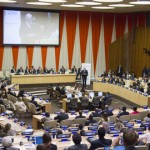Second Session of the Open-Ended Working Group on Ageing, 1-4 August 2011viernes, 29 julio 2011 As the increase in the number of older persons continues to accelerate – the annual growth rate was already more than twice of the total population between 2005 and 2010 – governments and civil society organizations are focusing more on the issues related to this segment of the population. In particular, concerns about the status of their social and economic situation, well-being, participation in development and its relationship to their human rights has slowly gathered momentum. The creation of the Open-Ended Working Group (OEWG) on Ageing In December 2010, the General Assembly established an open-ended working group open to all States Members of the United Nations for the purpose of strengthening the protection of the human rights of older persons (see resolution 65/182). The main goal of the working group is to consider the existing human rights framework in relation to older persons and to identify possible gaps and how best to address them. The working group will also consider, as appropriate, the feasibility of further instruments and measures to protect the rights of older persons. First session of the OEWG on Ageing – main conclusions The first working session concluded on 21 April, after a four-day series of panel presentations and discussions about the current rights situation and framework at t he international and regional levels. The session showed broad agreement among Member States, NGOs, UN agencies, intergovernmental organizations, and independent experts about the specific human rights challenges faced by men and women as they grow older. As it was pointed out that several provisions in human rights treaties apply to older persons because they are universal. However, there is no specific instrument devoted to this segment of the population and few existing instruments have explicit references to age.
There were several specific proposals put forward during the first session as a response to the human rights challenges faced by older persons, including a new international convention on the human rights of older persons and a special rapporteur to study and report on the situation of older persons. Another proposal was for more effective monitoring of the Madrid International Plan of Action on Ageing at the global level and more effective implementation of existing human rights instruments. For more information on the various proposals from the first session, see the report of the OEWG on Ageing (A/AC.278/2011/4).
The second working session from 1-4 August will focus on more specific issues and rights. There will be panel discussions and interactive dialogues on the following topics:
· discrimination and multiple discrimination;
· right to health of older persons;
· violence and abuse against older persons;
· social protection and older persons;
· age and social exclusion;
· identification of existing gaps at the international level and measures to address them.
In addition there will be several side events organized by NGOs on topics such as “Disability rights, access to palliative care, and lessons from the convention on the rights of persons with disabilities process”, “ The right to health: in conversation with older peoples”, and “Violence and Mistreatment of Older People: Continuing a Rights Based Dialogue ”. For more information you can consult the webpage dedicated to the OEWG at: http://social.un.org/ageing-working-group/index.shtml . Posted in : Ageing |

